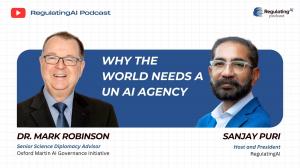Why the World Needs an International AI Agency: Lessons from Nuclear Governance
Dr. Robinson calls for an International AI Agency to tame the AI “Wild West,” unite global powers, and ensure innovation serves humanity before crisis strikes.
AI is probably not being hyped enough, and its impact is going to be quite incredible.”
WASHINGTON, DC, UNITED STATES, November 14, 2025 /EINPresswire.com/ -- In an age where artificial intelligence is advancing faster than regulation can keep up, the global governance landscape resembles a digital “Wild West.” Fragmented initiatives, overlapping regulations, and corporate self-policing dominate the scene. On The Regulating AI Podcast, host Sanjay Puri sat down with Dr. Mark Robinson, Senior Science Diplomacy Advisor at the Oxford Martin AI Governance Initiative, University of Oxford, to discuss why the world urgently needs an International AI Agency (IAIA)—and how lessons from nuclear governance might light the path forward.— Dr. Mark Robinson
Learning from the Nuclear Playbook
Dr. Robinson draws inspiration from the International Atomic Energy Agency (IAEA), a global body created in 1957 that still unites adversaries under a common cause: the safe use of nuclear energy. He cites the ITER fusion project, where the United States, China, and Russia share intellectual property daily, as proof that collaboration is possible even among rivals. “It took 20 years of negotiation to reach a 21-page agreement,” he notes, emphasizing that progress in global governance demands patience, persistence, and necessity.
The IAEA’s success rests on several pillars: transnational expert networks, or “epistemic communities,” that operate beyond politics; institutional resilience that has survived disasters from Fukushima to Crimea; and a founding principle known as “Atoms for ”Peace”—balancing the interests of nuclear “haves” and “have-nots.” Crucially, its General Conference model ensures all nations, even adversaries, sit at the same table.
AI’s Fragmented Governance Landscape
By contrast, AI governance today is a patchwork. From the EU AI Act to AI Safety Institutes, ISO standards, and UN advisory bodies, dozens of initiatives are emerging—often duplicating efforts. “It’s a plethora problem,” Dr. Robinson warns. With no central coordination, technology companies fill the vacuum, setting their own standards.
He draws a sharp comparison: nuclear governance is centralized and legitimate; climate governance, while well-meaning, remains fragmented and slow. The question, he asks, is simple: Which model will AI follow?
The Case for an International AI Agency
Dr. Robinson envisions a two-phase process. The first step could be a U.S.–China bilateral AI agreement—possibly by 2028—focusing on AI use in nuclear command systems. Once trust is established, it could expand into a UN-backed International AI Agency.
Like the IAEA’s modest beginnings, the IAIA could start small—with around 70 staff—and grow credibility over time. Leadership roles such as a director general and a Board of Governors would anchor legitimacy. Its mission: balance the interests of major AI powers, middle-tier nations, and the Global South, while engaging Big Tech without regulatory capture.
Challenges and Imperatives
Unlike uranium, algorithms are intangible and evolve constantly, making verification far harder. Yet, as Dr. Robinson points out, national security fears could drive—not block—cooperation. History shows that existential risk can unite even adversaries.
“The current fragmentation benefits corporations, not citizens,” he cautions. With AI’s impact “probably not being hyped enough,” the window for shaping global rules is closing fast.
A Call to Act Before It’s Too Late
Dr. Robinson’s message is clear: humanity needs an AI equivalent of “Atoms for Peace.” The world’s powers—along with industry and civil society—must act before a crisis forces them to.
As host Sanjay Puri summed up, the proposal is bold but grounded in precedent: “If nations could collaborate on nuclear safety at the height of the Cold War, they can certainly cooperate on AI.”
The question, then, is not if an International AI Agency will emerge but whether it will be born of foresight or of regret.
Upasana Das
Knowledge Networks
email us here
Visit us on social media:
LinkedIn
Instagram
Facebook
YouTube
X
Legal Disclaimer:
EIN Presswire provides this news content "as is" without warranty of any kind. We do not accept any responsibility or liability for the accuracy, content, images, videos, licenses, completeness, legality, or reliability of the information contained in this article. If you have any complaints or copyright issues related to this article, kindly contact the author above.


